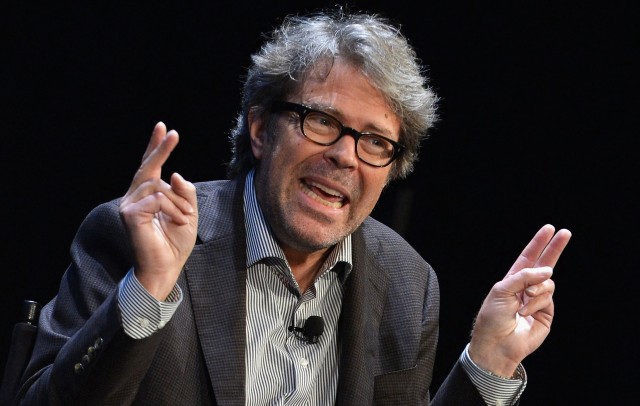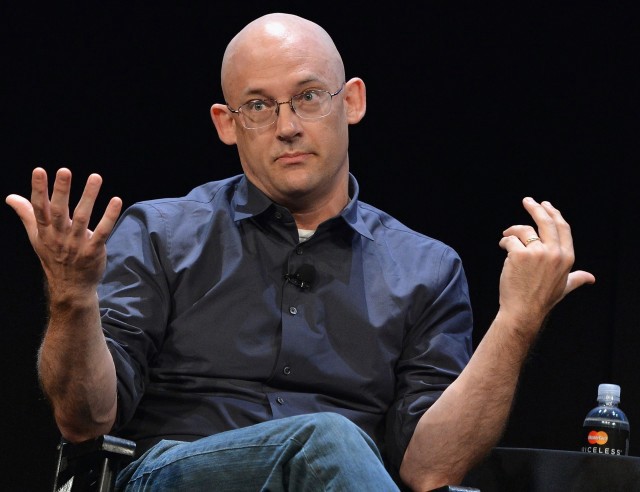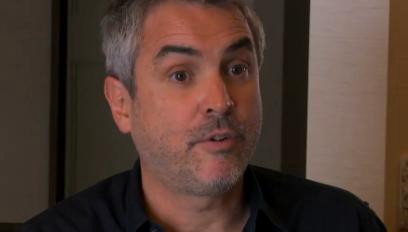Interface Bad
I can’t quite put my finger on it but for some reason this essay, “How ‘Minority Report’ Trapped Us In A World Of Bad Interfaces,” seems timelier than ever. Maybe it’s something in the air.
Jonathan Franzen And Clay Shirky Fight Over Their Girlfriend, The Internet
by John McDermott

The event wasn’t supposed to be some run of the mill afternoon of discourse. It was anticipated like an Ali-Frazier bout of verbal sparring, and it featured two thinkers with polarized views about my favorite subject: whether technology is good for the culture.
In one corner of this New Yorker festival production was best-selling novelist and maybe-lovable curmudgeon Jonathan Franzen. He was there to represent a starchy, Luddite view. Franzen is the author of million-selling The Corrections and Freedom (and two other novels!) but others know him best as the man who defied Oprah. In the other corner was media and technology theorist Clay Shirky. Shirky is the only person to simultaneously hold positions in New York University’s arts and journalism schools, Henry Finder, the day’s referee and editorial director at The New Yorker, said. Shirky was there to represent the cyber utopian view that the technology (and the Internet, specifically) is the answer to all of society’s ills. (Okay, not all.)
Like most attendees, I assume, I was eager to see two smart blowhards throw vocal haymakers at each other.
That didn’t happen. The debate was decidedly cordial. The two were equally well mannered and their arguments nuanced. Instead of vehemently arguing their respective positions, Franzen and Shirky acknowledged the merits of each other’s arguments and responded with elegant, well-thought counterarguments. It was the exact opposite of a YouTube comments thread.
And this disappointed me. I sacrificed a Saturday afternoon — my birthday afternoon, no less — hoping to see a full-on war of words. What I witnessed instead was a polite verbal shoving match.
Is technology good for the culture?
“Maybe,” Franzen said.

The impetus for the debate was Franzen’s latest book, The Kraus Project, in which Franzen translates and comments upon the work of turn-of-the-previous-century Viennese satirist Karl Kraus. (As Shirky pointed out, it’s one of the weirdest cultural criticisms ever written.) An excerpt ran in the The Guardian recently, setting off something of a flamewar online (this was shortly before the book was trashed in the Times), and I fully expected Franzen to be as vitriolic as he was in that piece.
Instead Franzen discussed his avid “Breaking Bad” fanhood; surprising as he once published a lengthy essay about why television is intrinsically evil. One gets the impression from reading him that Franzen won’t tolerate anything more stimulating than bird-watching.
He did say that technology seems to be irrevocably fucking up the things he loves most. Aside from the Internet upending the book and journalism industries, Franzen’s biggest gripe is that the benefits of technology are so irresistible that they end up detracting from our real-world lives. Technology’s problem isn’t that it’s bad; it’s that it’s too much of a good thing.
“It’s just great to press the button and get that next text,” Franzen said. “Somehow we’ve gotten so good at making these machines that we can have interactions with but somehow our psychology of these interactions is still so primitive.”
Shirky — who partially agreed with all of Franzen’s criticisms — conceded the point, but said he believes technology is the answer to that technological problem. If technology negatively affects human interactions, then we need to reorient our technologies toward our desired behavior.
Whether we should somehow “limit” technology or enjoy its endless abundance of information became the crux of the subject.
The Internet has turned otherwise passive media consumers into active media creators, Shirky said. And while it may be annoying for your friend to bug you about reading his blog or supporting her Kickstarter, democratizing the exchange of information is most certainly a good thing to Shirky.
“I’m pegging the needle for amateurs to create in public,” he said. “In a world in which almost everyone is remanded into full-time consumption, any move toward production or sharing is a healthy one.”
Franzen prefers the just-deceased older model, the one that made him rich and famous.
“I’m projecting my own unhealthy relationship with all stimulus at all times,” he said. “Fiction is created under conditions of absorption, and to be constantly drawn out of that…. Abundance is good up to a point. What we have now is practically infinite abundance.”

It would be impossible to have a wholly informed view of Franzen’s take on technology from just having attended the Saturday debate. Apart from characterizing it as “boring,” it’s difficult to contextualize Franzen’s anti-technology sentiments unless you’re familiar with his fiction.
For the uninitiated, Franzen’s outlook on life as expressed in his novels is as follows:
Life is just a long, sad series of compromises that separates each of us from the kind of person we had always hoped we’d become, but we’re so eager to ignore our crushing disappointment with ourselves, to make ourselves believe that we are indeed happy people whose lives turned out just the way — perhaps even better than! — we had always expected them to, that we constantly deceive ourselves (and our loved ones) into thinking we’re content with life. And then, one day, many years later, we grow tired of the charade and accept that, yes, we have failed our younger selves and that everything we did in those years prior to convince ourselves otherwise was just part of a long, elaborately-choreographed but awkwardly-executed dance and now all we can do is look back and laugh and cry at how silly we all were for believing the lies we told each other.
Life sucks then you die, and everything you do in between is aimed at distracting you from that uncomfortable truth, and nothing is as endlessly distracting as the Internet. If Franzen’s goal is to get his readers to be more present in their own lives, then the Internet is the ultimate foil.
He’s not entirely right. Life can indeed be sad and lonely, but technology can bridge that gap when used “correctly.” Now you can see photos of your niece who lives on the other side of the country; you can feel as if you’re not completely missing out on her infant years. You can Skype your boyfriend who’s studying abroad and feel relieved once you look into each other’s pixelated eyes. Your friend from college — the one with whom you immediately clicked because his music taste was miraculously similar to yours — sends you a song through Spotify and you listen to it and of course you love it and you appreciate that there’s someone, somewhere who not only shares your taste but appreciates it, and you, enough to try to turn you on to a new band. Or perhaps you hate the song and you laugh as you recall spending countless hours getting high as a fucking kite with that person and debating which bands did and did not suck at that point in time and for what reasons. You might have disagreed, but you were just happy to have someone with whom to sit around with, to get high and listen to music with for hours at a time. Your friend sends you a Snapchat, a 10-second long video performance — and you and you alone are the intended audience.
It seemed to me that many left the New Yorker Festival event disappointed that there was not an authoritative (or at least persuasive) opinion regarding whether technology is good for the culture. I was happy none was given; trying to definitively answer that question is a fool’s errand, if a fun one.
Technology does not necessarily advance or diminish people’s lives. Technology is an extension of life itself: it can be as lonely or happy as you make it. You can use it to get lost in an echo chamber of self-importance, or you can use it to make genuine connections with people.
Throughout the debate I was getting texts from friends. I had ditched them to attend this panel. It was, after all, my birthday. They had come in from Chicago. They were drunkenly riding Citi Bikes across the city, urging me to come meet them. I hadn’t seen this particular group of friends in months. We keep in touch via Gchats, texts, Facebook posts and emails. Now they were right here. I raced from the boring debate to meet up with them. We ate, drank and laughed until the next morning. It was the most connected I’ve felt in awhile.
John is writer living in Manhattan. He has written for Vice, Fast Company, Playboy, the Chicago Tribune, Inc., and Ad Age. Photos by Getty Images for The New Yorker.
New York v. London

This interview with Alfonso Cuarón is so great:
“There’s more a sense of a fun intellectual community in New York. Here [in London] it is not. This is a city supported and made by the banks. And also, British upper classes are very philistine, while in the U.S. you can have an upper class that is cultivated, not necessarily good or bad, so that they support the arts. And because of that, with all the flaws of the U.S., something it keeps that is great is the sense of possibility. Look, I can be critical about a lot of stuff around U.S. politics and stuff, and something I hope it doesn’t lose, because it makes the country great, is the sense of possibility. Europe, in general, before you even throw the idea out, they are bored. It’s an old continent attitude of been there, done that, where in the U.S., there’s a sense of possibility, and maybe it’s part of this school of capitalism that nobody wants to suddenly say no to something that may be big later on, might make money. It creates an energy. New York is buzzing. I think it’s beautiful. You can go to dinner and there’s a master painter from the sixties or seventies, a philosopher, actor, and then that kid that is 18 and you say, What is that? ‘Oh, he’s an up-and-coming painter and he just arrived from New Orleans.’ And because of that sense of possibility that maybe he’s going to make it, then there’s this blend of ideas but also social classes. In L.A., that doesn’t happen. But you never know if that black kid who just arrived from New Orleans is going to be an amazing artist — at least for two years, then you dispose of him. [Laughs.] But they give the benefit of fate, of the doubt, so that is great.”
1. How much do you love Alfonso Cuarón? 2. How happy do you think Mayor Smaug is going to be when he leaves New York City at the end of the year for his new life in London?
Meat Discovered In Chicken Nuggets

“The nuggets came from two national fast food chains in Jackson. The three researchers selected one nugget from each box, preserved, dissected and stained the nuggets, then looked at them under a microscope. The first nugget was about half muscle, with the rest a mix of fat, blood vessels and nerves. Close inspection revealed cells that line the skin and internal organs of the bird, the authors wrote in the American Journal of Medicine. The second nugget was only 40 percent muscle, and the remainder was fat, cartilage and pieces of bone.”
Minor Alps, "Far From The Roses"
If you have fond memories of the ’90s it is probably because that was the last time you had any excuse for optimism. I mean, sure, even then you had a sneaking suspicion that every deck was stacked in the favor of someone other than yourself and that the ground upon which you stood only seemed so spiffed up so that it would be that much more painful when they finally ripped the rug out from under you, but it was back in those waning dream days that you were still able to silence such doubts and con yourself into being excited about the future. So if you are that person who has fond memories of the ’90s you will appreciate this new song from Minor Alps — the dude from Nada Surf and the girl with the sister — because it sounds just like those final moments of hope your life once held. Enjoy!
Meet The Leonardo da Vinci Of Provocative Tomato-Based Cheese-and-Bread Themed Ensembles
If you missed this profile of the artist from whose fertile imagination sprung the “sexy pizza costume,” oh what discoveries await you here.
There Are Still A Few Low-Paying Jobs For People
“Supermarket checkout — a low-wage job that doesn’t require much training — sounds like it should be similarly vulnerable to robotic invasion. But it turns out that checking out groceries requires just enough mental-processing skills to be a prohibitive challenge for computers. In that way, supermarket checkout represents a class of jobs that computers can’t yet match because, for now, they’re just not very good substituting key human abilities.”
Sleigh Bells, "Riot Rhythm" (Live)
If, like me, you are slow to start this Monday morning, trapped in torpor, weighed down by regret and barely bobbing to the surface of a pond of despair, I would like to tell you that things will get better. I would like to tell you that, but we both know it would be a lie, and it’s too early in the week for either of us to fool ourselves with those comforting untruths. The best I can do is point you to this video, and this one, from Sleigh Bells’ Saturday night show at (The) Goldfish. It should at least kickstart your day, not that you really want to be that aware for any of it.
Three-Legged Pit Bull Least Confusing Part Of Correction
“An article last Sunday about the 3-Legged Dog theater company, which has overcome many problems because of its technological innovations, gave an incorrect amount from the company for its annual budget. It is $3.5 million, not $2.5 million. The article also misstated part of Aaron Louis’s title when he was with the company. He was producing director, not managing director. The article also misstated the Joyce Theater’s role in the dance-performance piece ‘Deepest Man,’ by James Scruggs. The Joyce is not a producer on the piece, though it is scheduled to run there in May. In addition, the article quoted incorrectly from comments by Kevin Cunningham, 3-Legged Dog’s executive artistic director, about Sid, the three-legged pit bull who inspired the company’s name. He said Sid ‘became a symbol of persistence of vision in the face of adversity’ — not a ‘perception’ of vision. And, finally, an accompanying picture caption misspelled the surname of one of the actors who will appear in the company’s production of ‘Tyson vs. Ali,’ which is coming in January. He is Jon Swain, not Swaine.”
